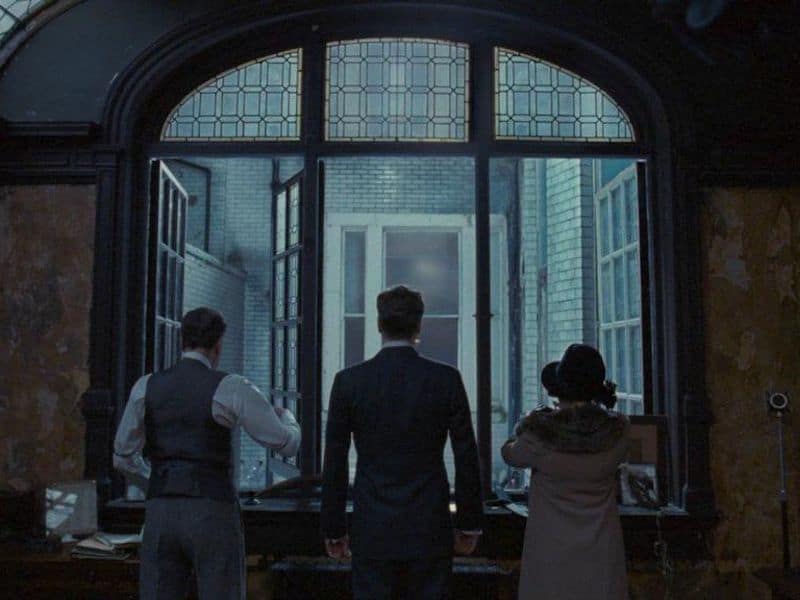
Editor’s Note: This review originally ran in November 2010, but since The King’s Speech just won the Academy Award for Best Picture, it seemed incredibly relevant. Enjoy.
According to the dictionary, to be kingly is to be “stately or splendid, as resembling, suggesting, or befitting a king; regal.” The great movie kings – Henry II, Richard III, Arthur – fit that description, being strong, alpha male types, domineering presences unafraid to exert their authority and make their reign felt.
What a surprise, then, to encounter George VI (Colin Firth) in Tom Hooper’s eloquent, emotional The King’s Speech. The current Queen Elizabeth’s father ascended to the throne in 1936, at a time that called out for a forceful leader. With scandal in his wake, spurred by his brother Edward’s abdication, and the European continent on the precipice of war, the new king faced the daunting task of inspiring an empire rife with tumult.
Yet, as the movie makes clear, the man born Albert Frederick Arthur George was not inherently up to the task. This was not your everyday king: With a stammer developed during childhood, a history of being picked on and ignored in favor of dashing older brother Edward (Guy Pearce), and severe confidence issues as a result, George needed to convince no one more than himself that he could do what must be done.
The King’s Speech, written by David Seidler, works in large part because it transforms the most remote and aloof of figures into a relatable, vulnerable individual, reducing the burdensome task of leading an empire to its most private, elemental facet. In telling the story of George’s lessons with speech therapist Lionel Logue (Geoffrey Rush) and the burgeoning friendship between royal and commoner, the picture achieves the improbable feat of drawing out a king’s humanity and nullifying the pomp and circumstance that so often negates it.
The film begins in 1926 and interweaves the uncertain political events of the ensuing decade with George’s desperate attempts to seize control of his diction. Logue is the perfect man for the job; unfazed by royalty and unafraid to speak his mind, he hectors, cajoles, and, at times, infuriates his patient. For the first time, the bubble that has surrounded George (the Duke of York until his coronation) throughout his privileged life is stripped away. He faces a man who cares for him and interacts with him for the person he is, not the title he holds.
Firth and Rush, who have rarely (if ever) been better, impart the delicate dance between shy, intimidated patient and confident and worldly therapist with ease. The former, who had threatened to forever disappear into his stiff-upper-lipped Mr. Darcy caricature, utilizes his innate likability and unquestionable gravitas to portray a man stricken by the monarchy’s burdens, shy and unsure of his aptitude, struggling with deep emotional wounds, but resolute in his sense of what must be done. Rush, with a mischievous grin and persistent gleam, offers the “kingly” charisma, the confidence required, and a convincing impartation of the professional tact needed to evoke the right responses from Firth’s George. As their relationship subverts the common king-subject dichotomy, the actors form an affecting bond predicated on intimate, delicate therapy sessions that are, ironically, of great global import.
The recent invention of radio looms over the film, adding pressure to a monarchy expected to inspire an entire realm with its words. Hooper evokes the sensational, scary specter of such a powerful communications tool and sets it against an engaging presentation of the dark rumbling crises facing Britain. The filmmaker enhances those portents with Rockwellian images of the citizenry gathering around their radios, hanging onto every spoken word. The movie is, by any measure, an effectively dramatized depiction of the historical currents intersecting during the period.
But it achieves transcendence through its portrait of the two men at the heart of that rapidly approaching storm and in the quiet, patient ways Lionel helps the King see that his voice is the right one to guide them all through the morass ahead. As spoken by the exceptional leads, and presented in Hooper’s perfectly modulated tonal blend of lighthearted and sincere dramatic moments, Seidler’s words achieve a symphonic air. Every syllable spoken is imbued with the weight of the past, present, and future of millions – and the man who would lead them through the coming darkness.
The Upside: This is a terrific, rewarding movie, with great performances.
The Downside: There really isn’t one.
On the Side: Some have decried the film as middlebrow awards bait, which is a disservice. Sure, the signs are there: the Weinsteins, Geoffrey Rush, the British monarchy, etc., but this is an intelligent, well-made film that deserves any accolades it gets.
